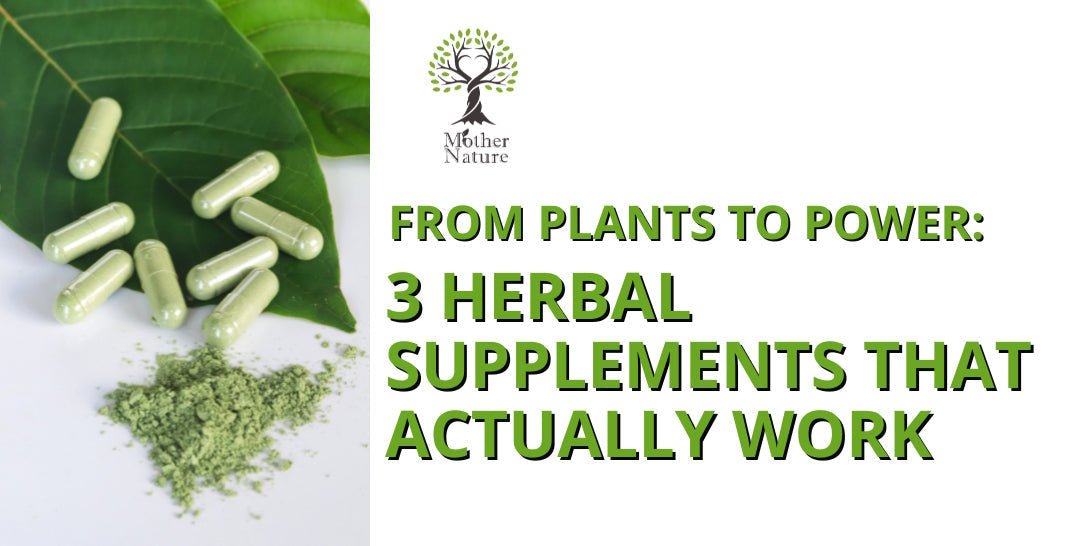From Plants to Power: 3 Herbal Supplements That Actually Work

Introduction
In the quest for optimal health and wellness, people often turn to nature’s pharmacy: plants. Herbal supplements, harnessing the power of plants, have been used for centuries to support various health functions. While the market is flooded with countless options, not all herbal supplements deliver on their promises. However, there are a few gems that stand out due to their effectiveness backed by science. Here, we explore three herbal supplements that truly work and can enhance your well-being.

1. Ashwagandha – The Stress Buster
Ashwagandha, also known as Withania somnifera, has been a cornerstone of Ayurvedic medicine for thousands of years. Known for its adaptogenic properties, ashwagandha helps the body manage stress and anxiety. Scientific studies have shown that this herb can significantly reduce cortisol levels, the hormone responsible for stress response.
In addition to its stress-relieving benefits, ashwagandha has been shown to enhance cognitive function, improve sleep quality, and even boost physical performance. This makes it a versatile supplement for those seeking a balanced approach to both mental and physical health.

2. Turmeric – The Anti-Inflammatory Powerhouse
Turmeric, or Curcuma longa, is another herbal marvel lauded for its potent anti-inflammatory and antioxidant properties. The active compound in turmeric, curcumin, is well-documented for its ability to reduce inflammation in the body, making it an effective natural remedy for conditions such as arthritis and joint pain.
The potential of turmeric extends beyond inflammation; it has been researched for its role in improving heart health, supporting the immune system, and enhancing brain function. However, it’s important to note that curcumin, when taken alone, has poor bioavailability. Pairing it with black pepper, which contains piperine, can significantly enhance curcumin absorption.

3. Ginkgo Biloba – The Memory Enhancer
Ginkgo biloba, derived from one of the oldest living tree species, is widely recognized for its benefits in cognitive health. Often used to improve memory and concentration, ginkgo biloba enhances blood flow to the brain and possesses powerful antioxidant properties that protect against neuronal damage.
Research suggests that ginkgo biloba can be beneficial in slowing cognitive decline associated with aging and neurodegenerative disorders such as Alzheimer's disease. It can also help alleviate symptoms of anxiety and depression, making it a valuable supplement for supporting overall brain health.
Conclusion
When it comes to herbal supplements, choosing ones that offer tangible benefits can be daunting given the sheer volume of products available. However, ashwagandha, turmeric, and ginkgo biloba stand out for their well-researched efficacy and safety. Incorporating these herbal powerhouses into your wellness routine can provide a natural boost to your physical and mental health. As always, consult with a healthcare professional before adding any new supplement to your regimen, especially if you are undergoing treatment or have existing health conditions. Harness the power of plants and experience the profound impact they can have on enhancing your vitality.
Blood pressure management is a crucial aspect of maintaining overall health, and herbal medicine can offer an alternative or complementary approach to traditional medicines. Many individuals seek out herbal remedies for their potential health benefits, including the regulation of blood pressure. However, it is important to consider the potential side effects of these natural options.
Herbal medicines, such as those used in Chinese medicine, often come with a wide range of applications. They may offer beneficial effects such as improved immune function and anti-inflammatory properties. Some herbs are used as blood thinners, which can be advantageous in certain health situations but may pose risks like increased bleeding or adverse effects in combination with prescription medicines.
A systematic review and meta-analysis of clinical trials on herbs like Asian ginseng have shown promising results for various conditions, including improved athletic performance and mental performance, yet they also highlight the need for caution. Human trials and extensive studies are necessary to better understand the long-term use and potential adverse side effects of these herbs, especially when taken as dietary supplements.
A significant consideration for herbal medicine is the risk of allergic reactions, which underscores the importance of consulting healthcare providers before starting any new treatment. This is particularly relevant when using products with anti-inflammatory effects for conditions such as premenstrual syndrome or topical application for skin issues.
The therapeutic use of herbs as anticancer agents also draws interest, although further research is needed to validate their efficacy and safety. As with any medicinal purposes, understanding the balance between health benefits and risks remains critical.
Long-term use of traditional medicines and herbal remedies requires careful monitoring to prevent adverse effects. Healthcare providers play an essential role in guiding patients, ensuring that both traditional and modern medicinal approaches are safely and effectively integrated into treatment plans.


